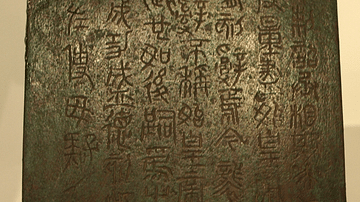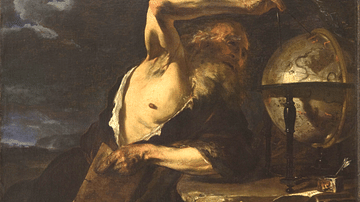Search
Search Results

Image
Philosophy Presenting the Seven Liberal Arts to Boethius
Anicius Manlius Severinus Boethius (c. 475-525 CE) is depicted on the far left. An allegory of Philosophy presents to him the allegories of the Seven Liberal Arts dressed in 15th century clothing, each holding a symbol of their subject; from...

Definition
Gottfried Wilhelm Leibniz
Gottfried Wilhelm Leibniz (1646-1716) was a German polymath who became well-known across Europe for his work, particularly in the fields of science, mathematics, and philosophy. Leibniz's rationalist philosophy attempted to reconcile traditional...

Video
Masterpiece: The Hindu Deities Shiva and Parvati
Apart from their damaged limbs, these 1,000-year-old Cambodian sculptures survive in excellent condition, and the fact that they have remained together makes them rare. These statues would have been in the inner sanctuary of a Hindu temple...

Image
Boethius & Lady Philosophy
Boethius and Lady Philosophy, a hand-painted illustration from an early print of Boethius' (c. 477-524/5) Consolation of Philosophy, Ghent, 1485.
Library of Congress, Washington D. C.

Definition
Legalism
Legalism in ancient China was a philosophical belief that human beings are more inclined to do wrong than right because they are motivated entirely by self-interest and require strict laws to control their impulses. It was developed by the...

Definition
Plato
Plato (l. 424/423 to 348/347 BCE) is the pre-eminent Greek philosopher, known for his Dialogues and for founding his Academy in Athens, traditionally considered the first university in the Western world. Plato was a student of Socrates and...

Article
Heraclitus: Life Is Flux
Heraclitus of Ephesus (l. c. 500 BCE) famously claimed that “life is flux” and, although he seems to have thought this observation would be clear to all, people have continued to resist change from his time to the present day. Heraclitus...

Definition
Anaxagoras
Anaxagoras (l. c. 500-c. 428 BCE) was a Pre-Socratic Greek philosopher who claimed the First Cause of existence was Mind (nous) and all things were constituted of indestructible “seeds” (or “stuff”), originally a single mass, separated and...

Definition
Konarak Sun Temple
The Konark or Konarak Sun temple is dedicated to the Hindu sun god Surya, and, conceived as a giant stone chariot with 12 wheels, it is the most famous of the few sun temples built in India. It is located about 35 km northeast of the city...

Video
The Birthplace of Western Philosophy - History of Ionia
Did you know that ancient Ionia was the birthplace of Western philosophy and science? This video is all about the fascinating region of ancient Ionia, the birthplace of Western philosophy, science, the Ionic Order of architecture, and the...